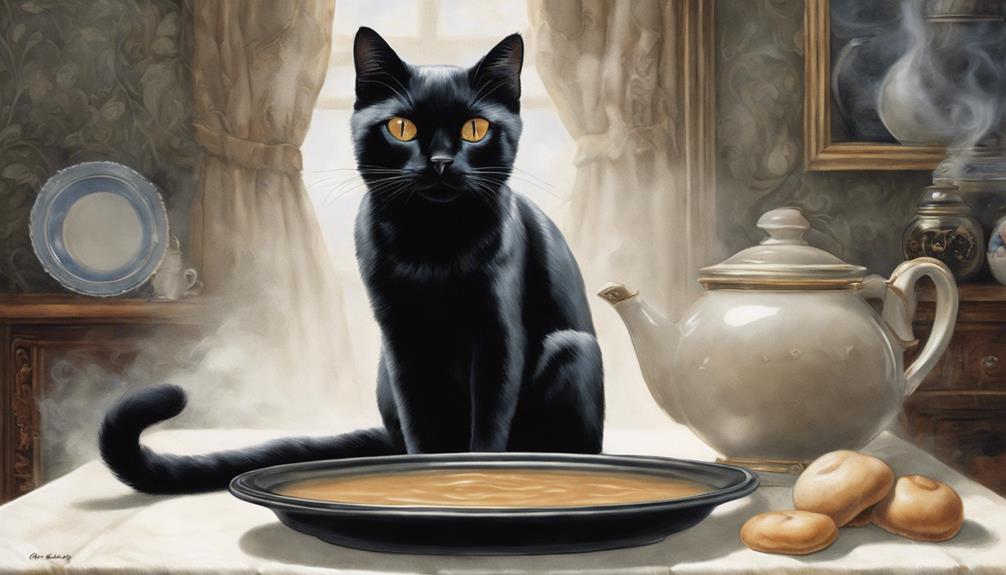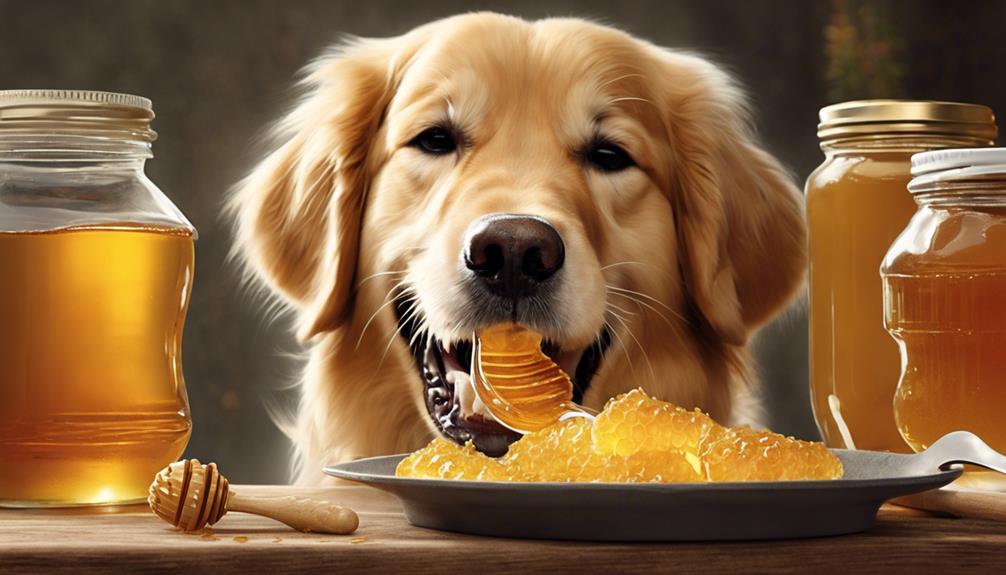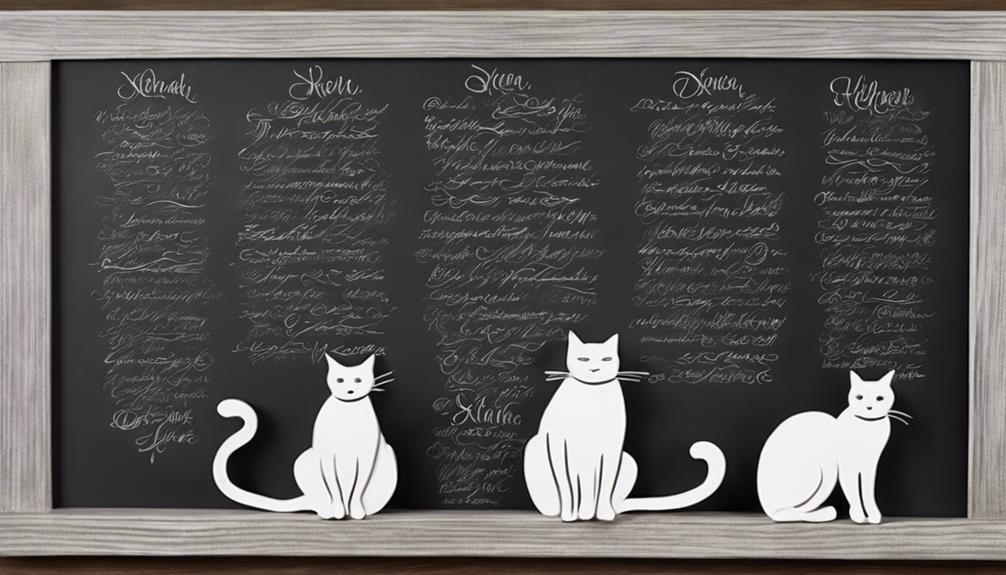Cats shouldn't have mushroom soup. It contains harmful ingredients like onions, garlic, and high salt levels. The soup may lack essential nutrients for cats' health. Stick to cat-formulated foods. Unsuitable foods can cause health complications. If interested, we have more insights on cats and mushrooms.
Key Takeaways
- Mushroom soup can contain harmful ingredients like onions and garlic, unsuitable for cats' digestive systems.
- High salt levels in mushroom soup are detrimental to cats' health.
- Cats should stick to specially formulated cat food to meet their nutritional needs.
- Feeding cats mushroom soup can lead to health issues due to ingredients that cats cannot digest.
- Consult a vet before offering any mushrooms or mushroom soup to cats to prevent potential health risks.
Cats Digestive System and Mushrooms
When it comes to cats and mushrooms, their digestive system struggles to effectively break down certain compounds found in these fungi. Cats are carnivores by nature, and their digestive systems aren't designed to handle plant materials like mushrooms efficiently. This means that when cats eat mushrooms, especially those with tough cell walls or indigestible fibers, it can lead to digestive issues. Even certain cooked mushrooms may still retain harmful substances that can be challenging for cats to process.
It's important to note that while some mushrooms are safe for cats to consume, many varieties can be toxic. For instance, mushroom soup, a common human dish, may contain ingredients that are harmful to cats. Consulting a veterinarian before offering any human food, including mushroom soup, to your feline friend is essential for their health and safety. By understanding how cats' digestive systems interact with mushrooms, we can make informed choices to keep our beloved pets safe and healthy.
Toxicity of Mushrooms for Cats
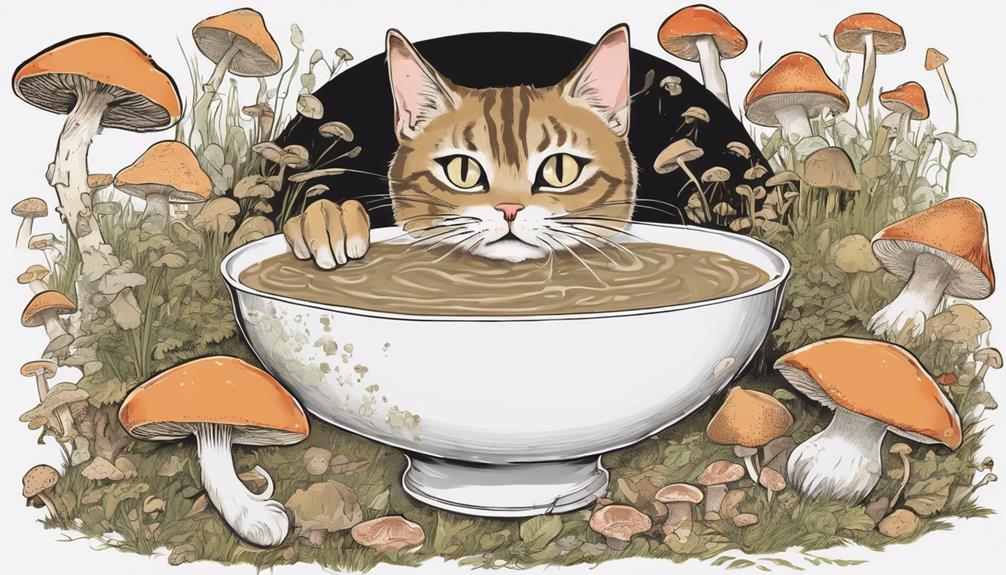
In considering the toxicity of mushrooms for cats, it's vital to be aware of the potential dangers certain fungi pose to feline health. Some mushrooms can be highly harmful to cats and should be avoided at all costs. Here are three essential points to keep in mind:
- Toxic Mushrooms: Certain varieties of mushrooms contain harmful toxins that can be extremely perilous if ingested by cats. These toxic mushrooms can lead to severe health issues and even be fatal to our feline companions.
- Gastrointestinal Upset: Consumption of toxic mushrooms can result in gastrointestinal disturbance in cats. This can manifest as symptoms like vomiting, diarrhea, and abdominal pain, causing discomfort and distress to our beloved pets.
- Avoid Feeding: To safeguard the well-being of our cats, it's crucial to steer clear of feeding them any mushrooms, especially those of unknown origin or species. Prevention is key in ensuring our furry friends stay healthy and happy.
Risks of Mushroom Soup for Cats
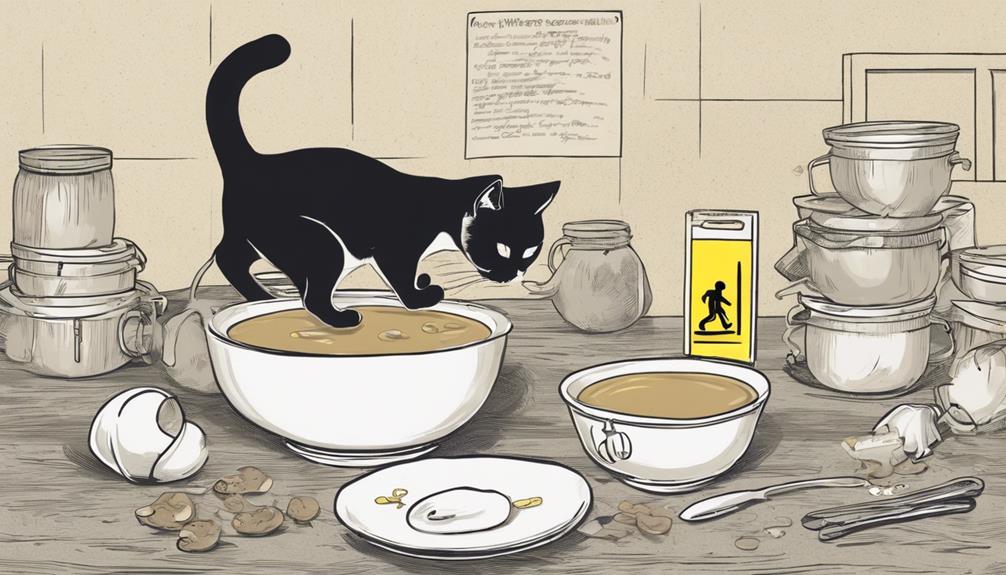
Cats should steer clear of mushroom soup due to the possible risks it poses to their health, including harmful ingredients like onions and garlic. These components can be poisonous to cats and may lead to various health issues. Additionally, the high levels of salt commonly found in mushroom soup can also be detrimental to a cat's well-being. Moreover, the ingredients in mushroom soup may not align with a cat's specific dietary needs, making it an unsuitable choice for our feline companions.
When cats eat mushrooms, they're exposed to toxic compounds found in certain varieties that can be harmful to their health. To guarantee the safety and health of our cats, it's essential to feed them specially formulated cat food that meets all their nutritional requirements. By avoiding mushroom soup and sticking to a diet tailored to their needs, we can help prevent any potential health issues that may arise from consuming unsuitable foods. Remember, our cats rely on us to make the best choices for their well-being.
Symptoms of Mushroom Poisoning in Cats
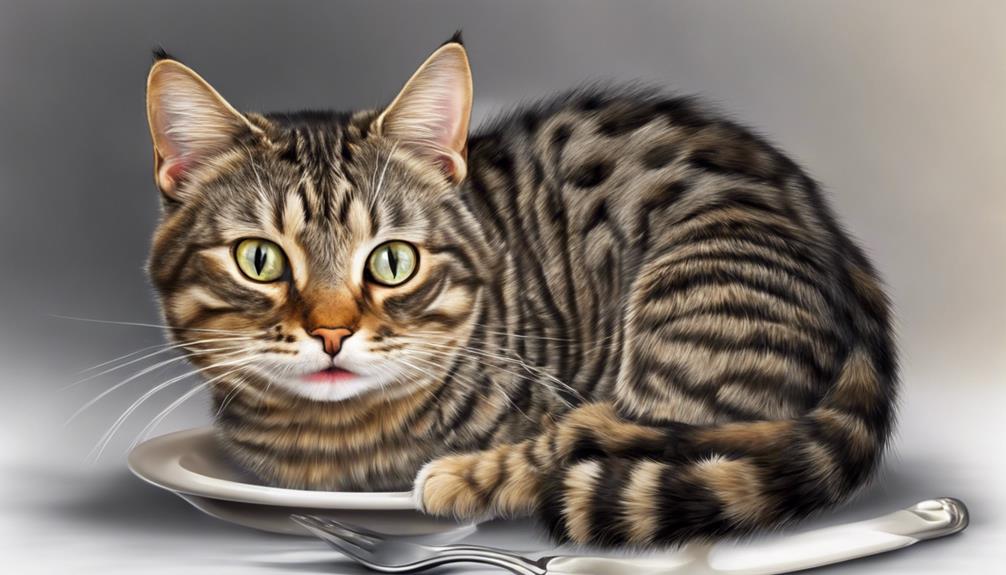
Experiencing gastrointestinal upset, neurological symptoms, jaundice, and changes in heart rate are indicators of mushroom poisoning in cats. When it comes to mushroom toxicity, our feline friends can show various signs that may signal danger.
Here are three key symptoms to watch out for:
- Gastrointestinal Upset: If your cat starts vomiting or having diarrhea after ingesting mushrooms, it could be a sign of poisoning. Keep a close eye on their bathroom habits and appetite changes.
- Neurological Symptoms: Excessive salivation, seizures, or even coma can be alarming neurological signs of mushroom poisoning. Any unusual behavior in your cat should prompt a visit to the vet.
- Jaundice: The yellowing of the skin and eyes, known as jaundice, is a serious symptom of severe mushroom poisoning. This visible change indicates a critical condition that requires immediate medical attention. Pay attention to any color changes in your cat's appearance, as it could be a red flag for their health.
Safe Mushroom Varieties for Cats
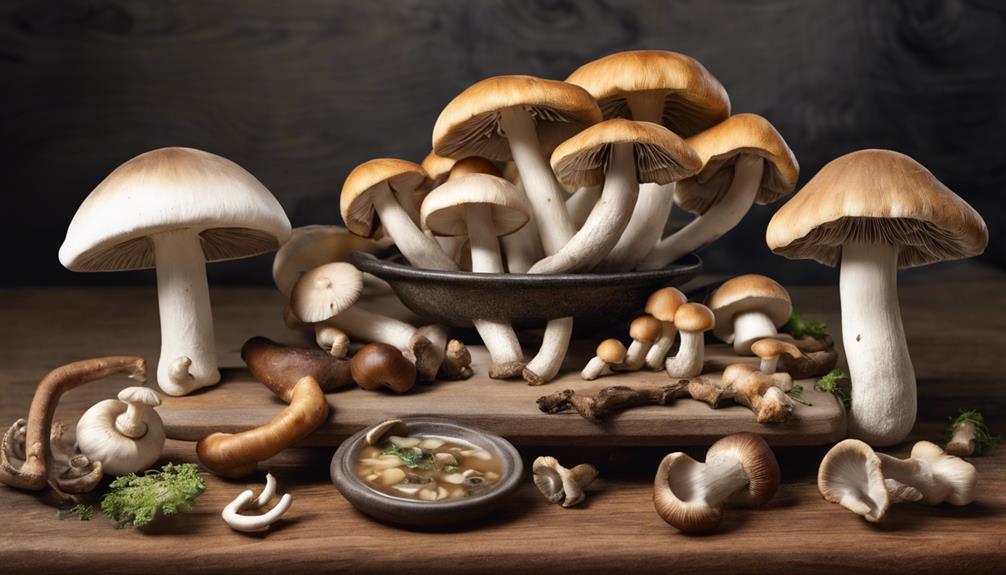
When considering safe mushroom varieties for cats, it's vital to stick to store-bought options like white button, cremini, or shiitake. These cultivated mushrooms are secure choices for our feline friends, providing a tasty treat when served in moderation. It's crucial to steer clear of wild mushrooms, as they can be harmful to cats and pose serious health risks.
By offering safe mushrooms like white button, cremini, or shiitake to our cats, we can guarantee that they enjoy a variety of flavors in their diet without compromising their well-being. Remember to serve these mushrooms unseasoned and cooked before offering them to your cat to avoid any potential digestive issues. While mushrooms can be a delightful addition to your cat's food repertoire, they should only be given occasionally and not as a primary source of nutrition.
Choosing the right mushrooms for your cat's meals ensures they can enjoy a safe and tasty treat without any worries about potential toxicity.
Cooking Mushrooms for Cats
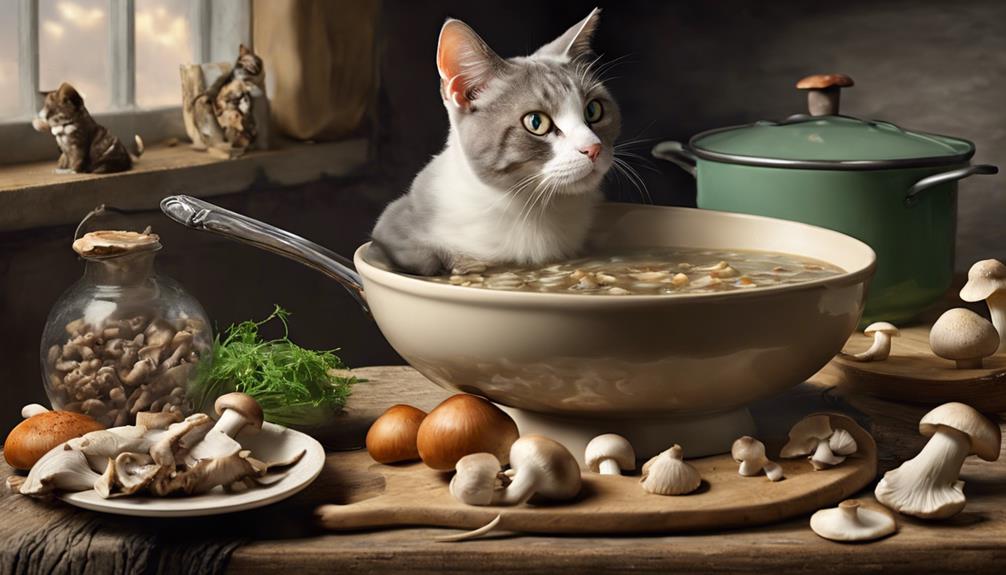
Cooking mushrooms for cats is essential for their safety and health.
By properly cooking mushrooms, we can make them easier to digest and eliminate potential harmful substances found in raw mushrooms.
Ensuring thorough cooking is vital to minimize any risks associated with feeding mushrooms to cats.
Mushroom Soup Risks
Mushroom soup poses potential risks to cats due to the inclusion of ingredients like onions and garlic, which can be harmful to their health. Here are three reasons why mushroom soup may not be suitable for our feline friends:
- Toxic Ingredients: Onions and garlic, commonly found in mushroom soup, contain harmful substances that can be toxic to cats.
- High Salt Content: The high salt content in mushroom soup can be detrimental to a cat's health, potentially leading to issues like dehydration or kidney problems.
- Nutritional Deficiency: Cats have specific dietary requirements for essential nutrients that may not be adequately met by consuming mushroom soup.
As cat parents, it's important to be mindful of what we feed our furry companions to guarantee their well-being and health.
Safe Mushroom Preparation
While mushroom soup may pose risks to cats, safe mushroom preparation involves using specific store-bought varieties like white button, cremini, or shiitake to guarantee feline safety. It's important to make sure the mushrooms are unseasoned and cooked thoroughly before serving them to your furry friend.
By opting for cultivated varieties and steering clear of toxic wild mushrooms, you can create a safe and tasty treat for your cat. Remember that store-bought mushrooms should be given in moderation and as an occasional indulgence rather than a regular part of their diet.
When prepared thoughtfully with your cat's well-being in mind, properly cooked mushrooms can be a delightful addition to their meals.
Mushroom Allergies in Cats
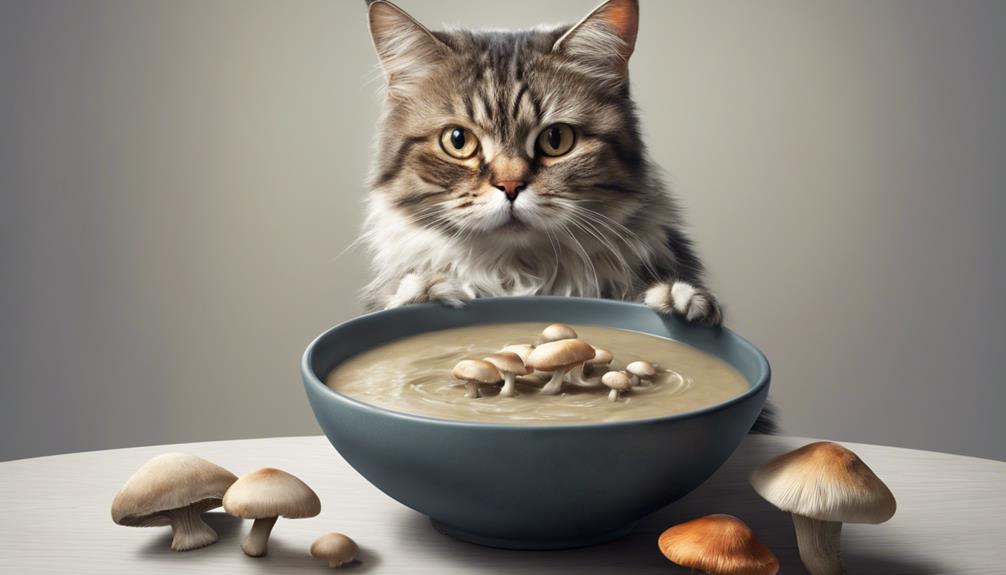
Although relatively uncommon, cats can develop allergies to mushrooms, which can result in a range of symptoms affecting their health and well-being. When it comes to mushroom allergies in cats, it's vital to understand the following:
- Symptoms: Allergic reactions to mushrooms in cats can present with symptoms such as itching, skin irritation, gastrointestinal issues, sneezing, coughing, or watery eyes.
- Severity: The severity of allergic reactions to mushrooms in cats can vary, ranging from mild discomfort to more severe complications that may impact their overall well-being.
- Veterinary Attention: If you suspect your cat is experiencing mushroom allergy symptoms, it's important to seek veterinary attention promptly. Your vet can provide guidance on managing the allergy and ensuring your cat's health and comfort.
Being aware of the potential for mushroom allergies in cats and understanding the associated symptoms and severity can help you take proactive steps to keep your feline friend safe and healthy.
Identifying Toxic Mushrooms
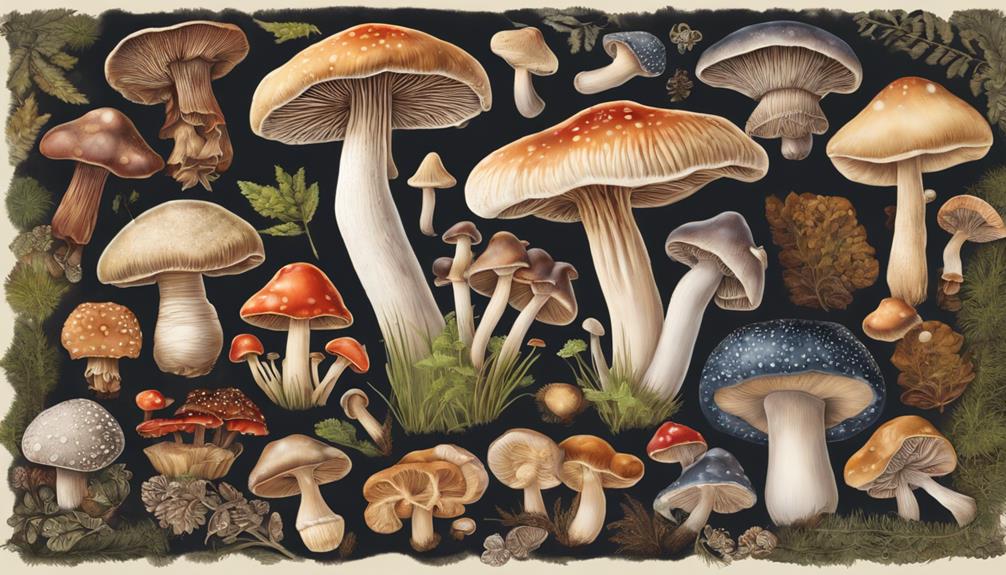
Identifying toxic mushrooms is essential to safeguarding our feline friends. Some harmful mushrooms have distinct characteristics that set them apart from safe varieties.
Knowing how to differentiate between toxic and safe mushrooms can prevent accidental ingestion by cats.
Toxic Mushroom Identification
Spotting toxic mushrooms that are harmful to cats requires sharp observation skills and knowledge of specific identifying characteristics. When it comes to spotting toxic mushrooms, here are three key points to keep in mind:
- Species Knowledge: Get familiar with toxic mushrooms like Amanita, Galerina, and Gyromitra that can be harmful to cats.
- Physical Characteristics: Pay attention to features like color, shape, and texture, which can help distinguish toxic mushrooms from safe ones.
- Consultation: If uncertain, seek guidance from experts or use reliable resources to guarantee accurate identification.
Harmful Mushroom Characteristics
As specialists in toxic mushroom identification, we must remain vigilant in recognizing key characteristics that differentiate harmful varieties from safe ones.
Toxic mushrooms contain compounds like amatoxins, muscarine, and gyromitrin, which pose serious risks to our feline friends. Identifying toxic mushrooms requires expertise due to the similarities between safe and poisonous varieties. Look for distinguishing features such as a ring on the stem, spore color, cap shape, and gill attachment.
Poisonous mushrooms can lead to gastrointestinal distress, liver damage, kidney failure, or neurological symptoms in cats. To keep our furry companions safe, it's crucial to prevent accidental ingestion by ensuring they don't have access to areas where toxic mushrooms may grow.
Stay informed and keep a watchful eye to protect our beloved pets from potential harm.
Safe Mushroom Alternatives
To ensure the safety of our feline companions, understanding the differences between safe mushroom alternatives like white button, cremini, and shiitake varieties and toxic mushrooms is essential. Here are three vital points to help you identify toxic substances and choose non-toxic mushrooms for your cat's well-being:
- Safe Mushroom Alternatives: White button, cremini, and shiitake mushrooms are safe options for cats when cooked properly.
- Types of Mushrooms to Avoid: Toxic mushrooms such as Amanita, Galerina, Gyromitra, Inocybe, Conocybe, Clitocybe, and Cortinarius species should be avoided.
- Identifying Toxic Substances: Knowing how to recognize toxic mushrooms is crucial in preventing poisoning incidents in cats.
Treatment for Mushroom Poisoning
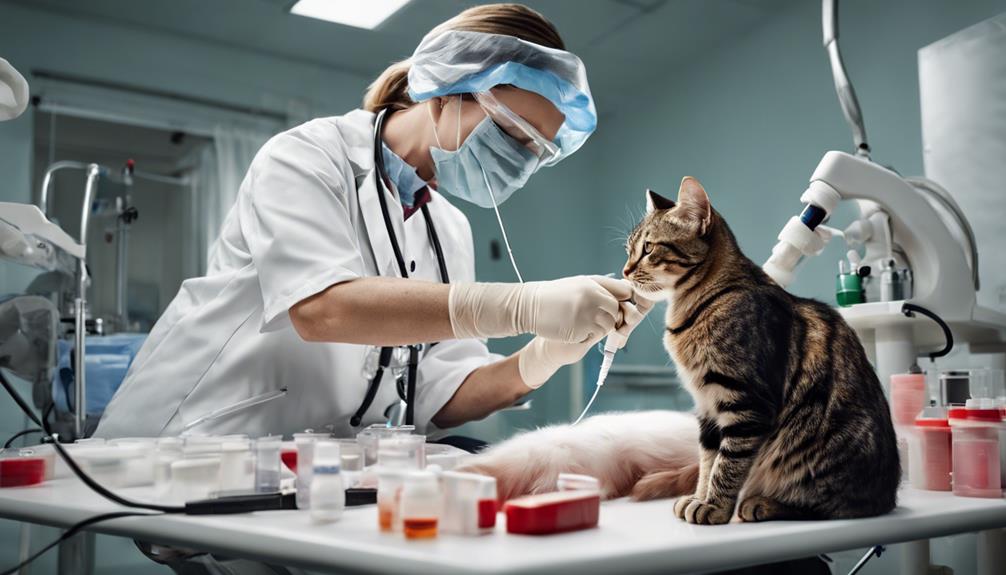
Treatment for mushroom poisoning in cats typically involves inducing vomiting to expel toxins from the system. If a cat ingests toxic mushrooms, it's important to act promptly. By causing the cat to vomit, we can help rid their body of harmful substances.
In more severe cases, activated charcoal may be given to absorb any leftover toxins in the stomach, aiding in the detoxification process. Additionally, providing supportive care such as intravenous fluids and medications to address symptoms like seizures or liver damage is essential for the cat's recovery.
Monitoring the cat's vital signs and blood work is crucial to evaluate their progress and response to treatment accurately. Remember, quick veterinary intervention significantly enhances the likelihood of a successful outcome when dealing with mushroom poisoning in cats. So, if you suspect your feline friend has consumed toxic mushrooms, don't hesitate to seek immediate professional help to safeguard their well-being.
Integrating Mushrooms in Cat Diet
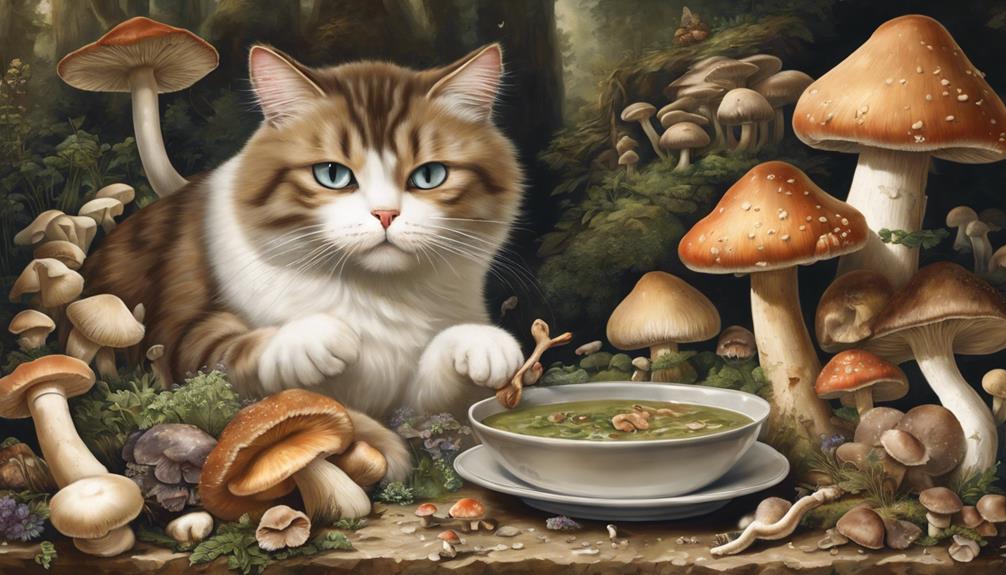
When contemplating incorporating mushrooms into a cat's diet, it's vital to weigh the benefits and risks. While mushrooms can provide certain nutrients advantageous to cats, such as protein and fiber, some varieties can be toxic to them.
It's imperative to carefully research which mushrooms are safe for feline consumption and consult a veterinarian before introducing any new food to your cat's diet.
Mushroom Benefits for Cats
Have you ever considered integrating mushrooms into your cat's diet to provide minor nutritional benefits and a savory flavor they may enjoy? Here are three reasons why mushrooms can be a positive addition to your feline friend's diet:
- Nutritional Boost: Mushrooms offer vitamins and antioxidants that can support your cat's overall health and well-being.
- Savory Delight: The glutamate found in mushrooms adds a delicious umami flavor that some cats find irresistible.
- Safe Option: Culinary mushrooms like button, cremini, and shiitake are safe for cats when cooked properly, making them a suitable occasional treat for your pet's enjoyment. Remember, moderation is key, and mushrooms shouldn't replace essential nutrients in your cat's balanced diet.
Risks of Mushroom Consumption
Integrating mushrooms into a cat's diet requires careful consideration due to the potential risks associated with mushroom consumption for felines. Mushroom poisoning in cats can lead to severe health issues, causing gastrointestinal upset and even being toxic to cats. It's vital to avoid feeding mushrooms to your furry friend to prevent any potential harm.
Cats have sensitive digestive systems, and certain types of mushrooms can be particularly harmful to them. To guarantee your cat's well-being, it's best to stick to their regular balanced diet that meets all their nutritional requirements. Consulting with a veterinarian before introducing any new food, including mushrooms, is essential to keep your cat safe and healthy.
Mushroom Soup and Cat Health
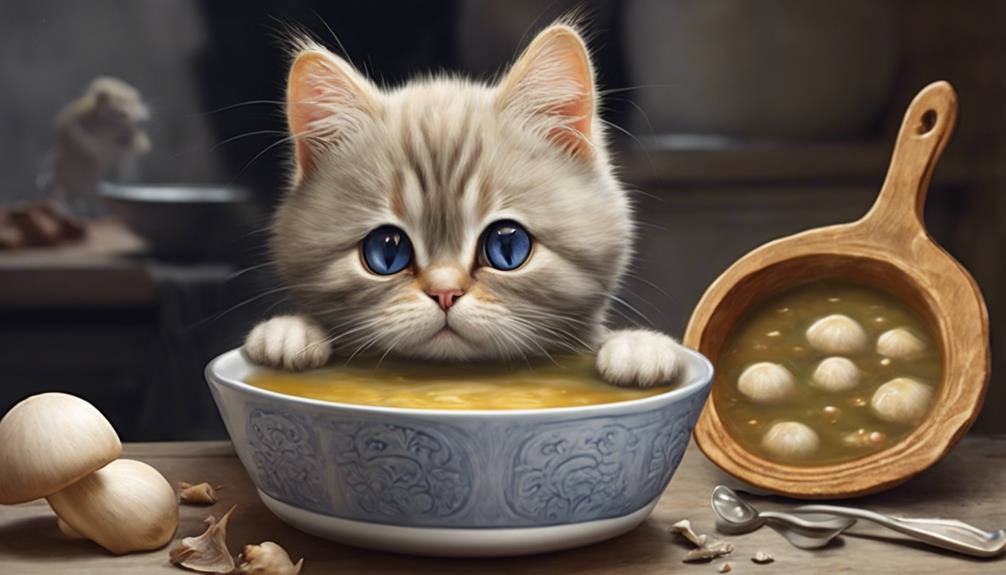
Discussing the implications of mushroom soup on a cat's health reveals potential risks due to harmful ingredients such as onions and garlic. While mushroom soup might seem like a cozy treat, it can be unsuitable for cats and pose potential health risks.
Here are three reasons why mushroom soup is harmful to cats:
- Toxic Ingredients: Onions and garlic, commonly found in mushroom soup, are toxic to cats and can lead to serious health issues such as damage to their red blood cells.
- High Salt Content: Mushroom soup often contains high levels of salt, which can be harmful to a cat's health, leading to issues like dehydration and kidney problems.
- Mismatched Nutritional Needs: The ingredients in mushroom soup don't align with a cat's specific dietary requirements. Cats need a balanced diet tailored to their carnivorous nature, and mushroom soup doesn't provide the necessary nutrients.
Considering these factors, it's best to avoid feeding mushroom soup to your feline friend to safeguard their well-being and health.
Mushroom Risks in Cat Foods
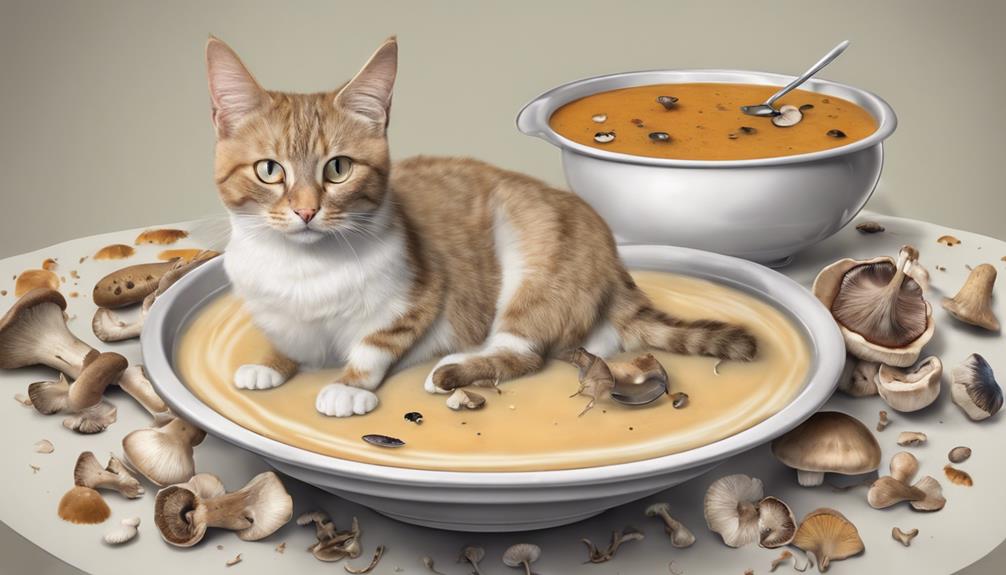
Mushroom risks in cat foods extend beyond mushroom soup, potentially introducing harmful ingredients that can adversely affect a cat's health. When considering the inclusion of mushrooms in a cat's diet, it's important to be aware of the potential health issues that may arise. Mushroom soup often contains ingredients like onions and garlic, which are harmful for cats and can lead to various health issues. Additionally, the high levels of salt commonly found in mushroom soup are not suitable for a cat's dietary requirements. Cats have specific dietary needs that must be met to maintain their well-being, and mushroom soup may not align with these needs. It is essential to carefully evaluate the ingredients in any cat food, including mushroom-based products, to make sure they are safe and beneficial for your feline friend.
| Mushroom Risks in Cat Foods | |
|---|---|
| Onions and Garlic | Harmful to Cats |
| High Salt Levels | Health Issues in Cats |
| Not Meeting Dietary Needs | Potential Harm |
| Specific Dietary Requirements | Cat Well-being |
| Ingredient Evaluation | Ensuring Safety |
Mushroom Soup Vs. Raw Mushrooms
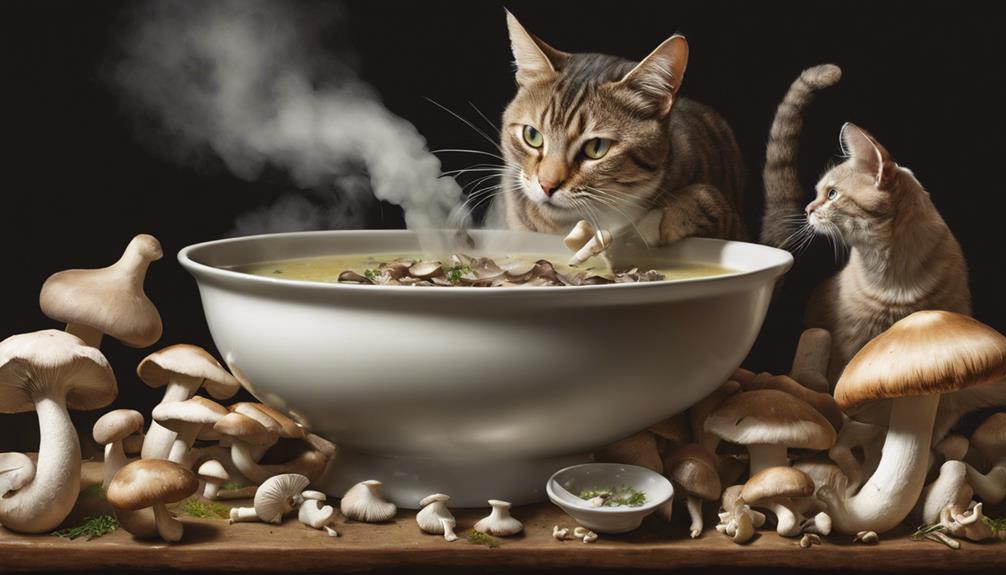
When comparing mushroom soup with raw mushrooms in relation to feline nutrition, it's important to take into account the potential impact on a cat's health and dietary requirements.
- Mushroom soup often contains ingredients like onions and garlic that are harmful to cats, causing digestive issues and potential toxicity.
- Raw mushrooms, when cooked in soup, may lose some of their nutritional value for cats, diminishing the benefits they could provide in their natural state.
- High levels of salt in mushroom soup can be harmful to a cat's health, leading to dehydration and potential kidney problems if consumed regularly.
Considering these factors, it becomes evident that serving mushroom soup to cats isn't advisable due to the risks involved. It's essential to prioritize your feline companion's well-being by opting for safer and more suitable food options that align with their specific dietary needs.
Cat-Friendly Mushroom Serving Sizes
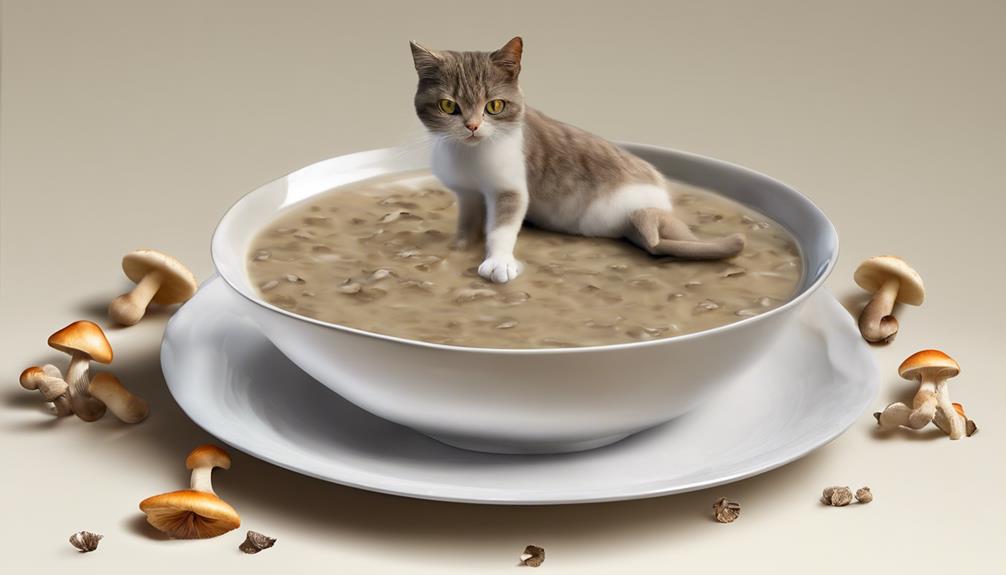
Cat owners should be mindful of appropriate serving sizes when incorporating mushrooms into their feline companion's diet. While mushrooms themselves can be safe for cats in moderation, it's essential to take into account harmful ingredients commonly found in dishes like mushroom soup, such as onions, garlic, and excessive salt. Cats have specific dietary needs that are best met with cat-formulated food, ensuring they receive the essential nutrients for their well-being. Mushroom soup, lacking balance and potentially harmful components, may lead to digestive issues if consumed by cats.
When determining cat-friendly serving sizes of mushrooms, always consult a veterinarian. They can offer tailored advice based on your cat's individual dietary requirements. Remember, what's suitable for humans may not align with our feline friends' needs. Ensuring the right portions and types of food are crucial for keeping your cat healthy and happy. By prioritizing your cat's specific dietary needs and seeking professional guidance, you can make informed decisions about incorporating mushrooms into their diet safely.
Mushroom Consumption Guidelines for Cats
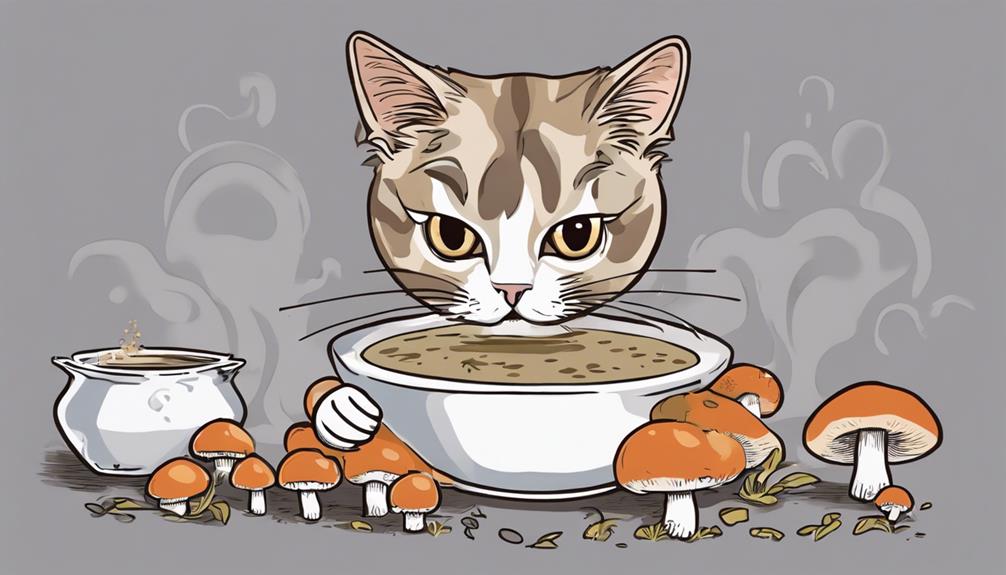
When contemplating mushroom consumption guidelines for cats, it's essential to focus on safe mushroom types and be aware of potential risks. Certain mushrooms can be toxic to cats and may cause health issues.
Always prioritize your cat's well-being by consulting with a veterinarian before introducing any new food items into their diet.
Safe Mushroom Types
Selecting the appropriate types of mushrooms is essential when contemplating including them in a cat's diet. When deciding on safe mushroom types for your feline friend, consider the following:
- Store-Bought Varieties: White button, cremini, and shiitake mushrooms are safe options for cats.
- Cultivated Mushrooms: These can be given to cats in moderation as an occasional treat.
- Avoid Wild Mushrooms: Due to the risk of toxicity, it's important to steer clear of wild mushrooms when feeding your cat.
Potential Risks for Cats
Considering the potential risks associated with mushroom consumption for cats, it's important to be mindful of their dietary requirements and the ingredients in foods like mushroom soup before offering it to them. Cats, as obligate carnivores, have specific nutritional needs that may not be met by mushrooms. Certain mushrooms can cause symptoms of toxicity in cats, ranging from gastrointestinal upset to more severe signs like tremors or seizures.
Additionally, mushroom soup often contains ingredients like onions and garlic, which are known to be harmful to cats. The high salt content in mushroom soup can also be detrimental to feline health. To guarantee the well-being of your furry friend, it's best to steer clear of offering mushroom soup and consult a veterinarian for guidance on a suitable diet.
Frequently Asked Questions
Can Cats Eat Mushroom Broth?
We recommend avoiding feeding cats mushroom broth due to potential toxicity from ingredients like onions or garlic and the high sodium levels. Cats, being carnivores, may not find mushroom broth appealing. Prioritize their health; consult a vet first.
What Are the Symptoms of Mushroom Poisoning in Cats?
Experiencing mushroom poisoning in cats reveals distressing symptoms like gastrointestinal upset, seizures, and changes in behavior. If your feline companion consumed mushroom soup, would they exhibit signs of toxicity like vomiting or jaundice?
Can You Give Cats Canned Soup?
We don't recommend giving cats canned soup. It's high in salt and may contain toxic ingredients like onions and garlic. Cats have specific dietary needs best met with balanced cat food. Consult a vet beforehand.
Can Cats Eat Mushroom Stems?
We enjoy giving our cats occasional treats like mushroom stems. They provide fiber and nutrients. Cook them well. Watch for any adverse reactions and seek vet advice if needed. Our cats' well-being is our top priority.
Conclusion
To sum up, while mushrooms can be a tasty addition to our meals, they can pose risks to our feline friends. It's important to be cautious and avoid feeding cats mushroom soup or any raw mushrooms.
Remember, only 1-2% of mushrooms are safe for cats to consume, so always consult with your veterinarian before offering any new foods to your furry companions. Prioritizing their health and safety is key in ensuring a happy and healthy life for your beloved pets.
